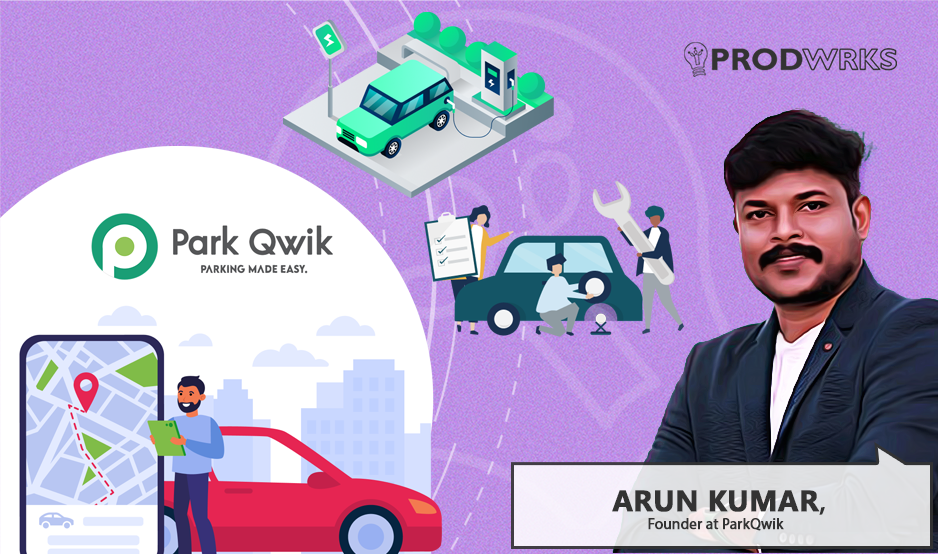
Every year, millions of new vehicles hit India’s roads, but parking infrastructure hasn’t kept up. The result is an urban struggle where finding a spot often feels like a game of chance. Drivers circle crowded streets again and again, scanning for openings, and the rare relief of securing a space can feel like a small victory.
Arun Kumar, the founder of ParkQwik, sheds light on the increasing demand-supply gap in the parking infrastructure.
He says, “India has around 420 million vehicles, where 75% are two-wheelers, and 13% are four-wheelers. With so many vehicles on the road, the demand for parking far outstrips the supply, highlighting a huge infrastructure gap.”
Arun experienced the gap in parking infrastructure firsthand. After the COVID lockdown, it took him more than two weeks to find a rental space that included parking, while securing a place without it would have taken only a few days.
This gap led to the creation of ParkQwik, a platform built to make parking more accessible and reliable in crowded urban neighborhoods. By focusing on the availability and management of parking spaces, it tackles one of the most frustrating daily challenges for city residents. Since its launch, the platform has served more than 10,000 members.
From EV Chargers to Urban Parking: Spotting the Hidden Problem
“The real problem was that we couldn’t immediately install the chargers,” Arun says. “Every OEM needs parking space and the right power line for each type of charger. That was the first time the issue of parking first struck in my mind.”
“Generally, parking is the main issue in all metro cities,” he explains. Most one-BHK houses in Bangalore and Chennai don’t have a slot. When people buy a car after a few years, they have to struggle for parking.”
A Marketplace Solution for Parking Supply and Demand
Arun says, “If you own a parking space, you can list it on the platform and earn income as a host. On the other side, if you’re a car or bike owner looking for a spot, you can book it directly through the app. I would say that we are like the Airbnb for parking spaces.”
Arun explains. “There’s hesitation, people feel awkward or uncomfortable asking their neighbours, but if you create proper infrastructure to connect the two sides, it can become a massive opportunity.”
Validating Demand and Building the Platform
ParkQwik’s thesis was initially tested out with a simple mobile number that users could call to avail parking slots and by listing on platforms like JustDial to check if there was real demand. Within a week, Arun saw the demand pour in, and he began receiving multiple enquiries from people struggling with parking.
This led ParkQwik to start experimenting with small-scale partnerships where the team strategically spoke with PG owners and smaller residential apartments to see if spare slots could be listed, and quickly realized that both hosts and vehicle owners were willing to try it.
Arun says, “Earlier, we only had a phone number, and later, to make the process smoother, we started with introducing a WhatsApp bot that acted as a bridge between the two sides.”
User Segments, Features, and the Subscription-Based Model
Arun says, “In co-working hubs, where dozens of startups operate but parking slots are scarce, we provide valet support. Cars are picked up from the workspace, parked in ParkQwik’s dedicated lots, and returned when needed.”
“If you need EV charging or security cameras, the price is higher. If it’s an open compound without a roof or cameras, it’s cheaper,” Arun says.
Targeting New Vehicle Owners and Navigating Parking Behaviors
Arun explains with a chuckle, “They worry about safety more than anyone else. It’s like newlyweds when something is new, you take extra care of it.”
“We even launched our logo with the Chennai Traffic Commissioner. You have to understand the ecosystem first, how many parking tickets are being issued, where the real pain points are, before you can place your brand there,” he says.
Cultural Barriers and Challenges in Building Supply.
One of the biggest hurdles Arun ran into was convincing people to actually list their unused parking spaces. Unlike housing, where owners are eager to rent out vacant properties on platforms like NoBroker, parking doesn’t carry the same instinctive demand.
Empty slots often went unlisted, and building that initial supply proved far more difficult than expected.
He says, “People are willing to list out their house easily, but not their parking space.”
Arun says, “The challenge is compounded by the country’s lack of proper infrastructure and high population density, a gap the government alone cannot fill, leaving few startups willing to tackle the problem.”
Embracing Automation
For Arun, the clearest signal that ParkQwik is on the right track isn’t a single numeric metric but consistent user adoption. “If people are signing up, the demand is clearly there,” he explains. He also looks at broader trends, like rising vehicle sales, to gauge the market opportunity, seeing these patterns as confirmation that the parking problem is both real and growing..
Looking ahead, ParkQwik is exploring how technology can transform parking in India. Arun is particularly focused on automation, from boom barriers to parking robots, which can help manage high-density urban spaces more efficiently.
Arun notes that easing government restrictions on importing such technology could unlock even greater potential, helping to reduce traffic congestion and improve parking infrastructure across the country.



